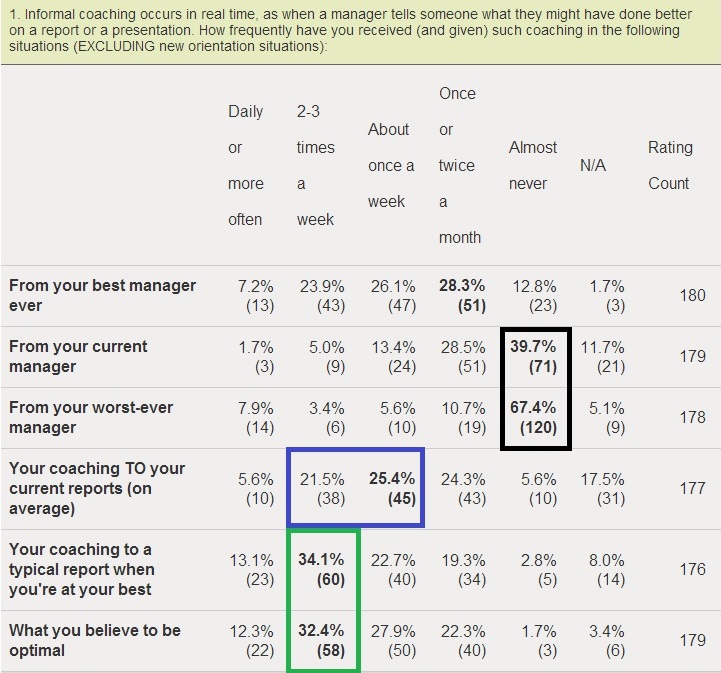Podcast: Play in new window | Download
Thanks to almost 200 of you who responded to last week’s survey, we have some pretty interesting data to look at over the next couple weeks. Today’s data — as my title suggests — gives us all a whack in terms of the contrast in the data. Here is a pretty self-explanatory table:
So the “whack” comes from the data in the black rectangle. When looking at which of the five intervals on which routine, real -time coaching occurred, the “current manager” and the “worst-ever” manager scored the same — NEVER. To put it differently, over 2/3 of the worst managers, and a whopping 40% of current managers “never” give real-time coaching. That is s-c-a-r-y. And, if you look up one row to the “best manager ever,” it doesn’t get a ton better. In fact, the highest category for best managers was once or twice a month.
Contrast those scores with the green rectangle of what people think they themselves do when they’re at their best, and what they think is “optimal.” In those scenarios fully 1/3 would or do coach 2-3 times a week. In these best-case and optimal cases, about 7 of 10 coach or would coach at least once a week on ongoing work. Only 2 in 10 current managers coach at this “at least weekly” rate, barely better than the 16.9% of the “worst-ever” managers.
The silver lining in the data is found in the blue rectangle. 52.5% of the readers who responded say they coach at least once a week — not so far off from the 70% optimal.
Unless you’re seeing something entirely different than I am, this data about real-time, day-in-and-day-out coaching is screaming at us as managers: PEOPLE WANT MORE FREQUENT COACHING AND FEEDBACK!
In the next couple weeks we’ll look at equally fascinating data on longer-term coaching and just what kind of coaching people want. Hint: more surprises ahead, as you
Lead with your best self!


I am inclined to want to learn what others–those that are “to receive” all of this coaching from their managers–really want. If mostly “leaders” responded to the survey, then the results are of course biased towards leaders’ views on this “practice” (concept). I think what first might be interesting is a definition of what coaching means from the “coachee’s” viewpoint and how this might company to a manager’s or leader’s viewpoint.
This also reminded me to re-read Ed Schein’s most recent book, “Humble Inquiry: The Gentle Art of Asking Instead of Telling.” I was lucky indeed to be able to see him in person last weekend in the Chicago area. Besides his seminal work on organizational culture, he has extensively written and studies career anchors and how leaders and others “help” employees/organizational/team members.
I know that within my own leadership team of 5 persons, some want to be coached every day, some want to be coached once per month, some don’t want coaching at all, but instead want something else that probably doesn’t fit into a definition of “coaching.” I found myself unable to respond to the survey last week because of these very thoughts, which came to mind as I went to answer.
I think an “optimal” number of coaching times, if there is such a thing, must necessarily be a function of the interaction between the coach and the coachee, somewhat akin to Lewin’s B=f(P,E), where behavior is the function of the interaction between someone’s personality and their environment.
Anna,
This is a remarkably thoughtful approach.
I certainly agree that different folks want different things from their coaches. I am sure we could dig much deeper, but it’s hard to argue with the data here, IMHO. If you go online you can see the results in terms of the levels people occupy in hierarchies. They are a pretty good mix of five “quintiles,” which I offered them. So, it seems to me that most are answering as “leaders,” as you say (I would label them “authorities” and hope they are leading), BUT they are also answering as people who are being coached. The huge majority of us — and of my readers — are neither CEO’s (who might still want coaching from their board chairs) nor front-line workers. So when they answer “optimal,” I think they are thinking both as those who are coaching and as those who are coached. No?
Although it will vary, it seems that what people rate as best — in experience and in speculation — is much more than they get, and a good bit more than they give!
Dan
I’m wondering if some of the data looks the way it does because, as managers, we may think we are coaching and the recipients may not feel they are being coached.